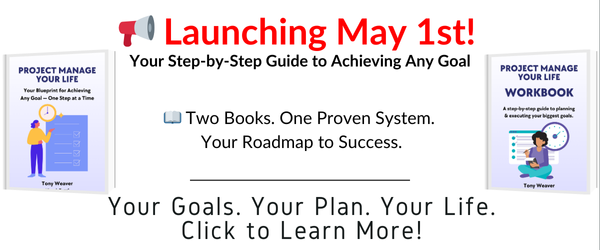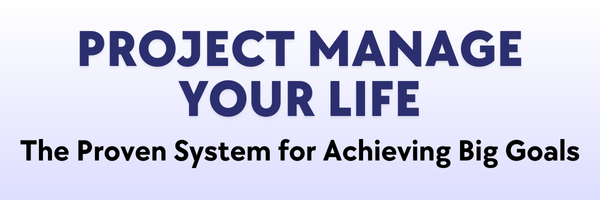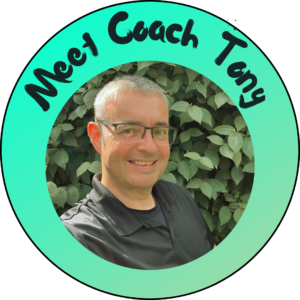My name is Coach Tony, and I am a believer in the power of project management.
In my twenty years as a professional project manager, I have witnessed project success drive business results. I have also proven that project management can change lives and help achieve personal transformation.
Now, I use project management principles as a coach to help clients achieve their life, health and professional goals.
In PM Believer, I share practical project management tips and techniques that you can use to help you achieve your own personal goals and live your best life.
Are you ready to become a PM Believer too?
Amuse-Bouche Before we jump into today's post, I offer you this "dad joke" as a light "amuse-bouche" to entertain your mind before we get serious. Like any other amuse-bouche, you may hate it, but it is worth every penny you paid for it, right? I saw a sign at a farm that said "Duck, Eggs!" I was contemplating the use of a comma when it hit me.
Flex Your Project Management Muscles To Become A Better Runner
My journey as a project manager started long ago. In 2007, after several years of managing portions of technology projects, I became a certified project manager. I had decided it was an excellent next step in my career growth. A colleague and I set a goal of getting our certification together, so I managed our prep as a project. Pretty meta, right?
A decade after becoming a project manager, I set a goal of losing over one hundred pounds in under a year using project management. An unexpected side effect of my weight loss journey is that I also became a runner.
I run at least three times per week and participate in one organized race per month. I have completed dozens of 5k races, almost a dozen four-miler races, several quarter marathons and five or so half marathons.
Note: it was NEVER a goal of mine to become a runner… today, I can’t imagine NOT being a runner.
One thing I learned after becoming a runner is that every run is a project. In this post, I will share how several techniques that make you an effective project manager can also make you a better runner.
It’s All About A Goal
I will start by explaining why I say every run is a project.
The Project Management Institute (PMI) defines a project as a temporary endeavor undertaken to create a unique product, service or result. This definition is a mouthful, for sure. A simplified definition would be “a temporary effort undertaken to achieve a unique goal.” At its heart, every project is about a goal.
Let’s explore how a run fits with this definition:
- Temporary: every run is temporary – though they may feel like they last forever.
- Effort: every run requires dedicated effort to make it happen.
- Unique: thanks to the millions of variables at play in a run, every run is also unique.
- Goal: every run has a goal, whether distance, time or other outcome.
In addition to fitting with the textbook definition of a project, each run benefits from a structured, repeatable approach. That also makes runs very project-like.
But there is one more way that every run is like a project. For this, it is time to look at our old project management friend: the triple constraint.
A Runner’s Triple Constraint
Every project is governed by three interconnected constraints (cost, time, and scope) that must be managed and balanced by the project manager. Any change to one of the triple constraints will affect the other two. Ineffective management of these constraints will impact the overall quality of the project/product. At its worst, this quality degradation could mean the project can’t be delivered.
The triple constraint is commonly represented as a triangle.
Each of these constraints also applies to running.
- Scope = the scope of your run is your distance.
- Time = all runs have a time component as represented by your pace.
- Cost = yes, runs have a cost… a cost to your body. This cost is a combination of fueling, hydration, body conditioning and recovery.
Like every project, the runner’s triple constraint requires proactive management. For example, if you run too fast, the cost to your body will increase, and your distance may decrease. If you don’t adequately manage your runner’s triple constraint, the quality of your run will suffer, and you will risk injuries or may be unable to finish your run.
If you’re a runner, you’re also a project manager. As a project manager, your awareness and balance of these three constraints will help you improve your performance while staying injury free.
Every Race is a Program
In project management, some goals are so big and complex that they cannot be achieved by a single project, lest they become too big and unwieldy to be managed. When this happens, multiple projects are initiated and managed in concert to achieve a common, broader goal.
These multiple, interdependent projects are all part of a larger entity called a program. A program is a group of related projects managed in a coordinated manner to obtain benefits not available from managing them individually.
The program approach also applies to running… every race is a program.
Like other significant goals, performance in a major race (marathon, half marathon and others) isn’t just a single run; you train for it. The training plan for each event will require multiple runs, each with its own goal that will build your capability to achieve the target distance and pace. When managed together, these runs develop your readiness for the broader goal: your race.
As a running project manager, you will also need to effectively manage this series of runs to achieve the program (race) goal. Yet another way that every run is a project.
Project Manage Your Runs
Have I made my case? Are you convinced that every run is a project? Great!
Let’s talk about how you can flex your project management muscles to become a better runner. Like most other goals, you can improve your runs by following my project manage your life best practices. Here are the six steps you can take.
1. Set SMART Goals:
Don’t just walk out your front door and start running, have a goal in mind for each run, even if that goal is fun and stress relief. By defining an objective for each run, you will know if it is productive and achieving your goal. This is especially important if the run is part of a bigger program.
2. Build a Plan That Works For You:
By definition, every run, like every project, is unique, so you need a plan for each run that’s tailored to your specific needs. Once you have set a goal for your run, determine the appropriate running strategy to help you achieve that goal. Are you running for stress relief? Maybe you’ll want to adopt an “easy run” pace a minute or two slower than your race pace.
Pro tip: be sure your plan also accounts for your nutrition, hydration, recovery and equipment (especially shoes) needs.
3. Measure Progress Every Day:
How long was your last run, and how fast did you run? What was the cost to your body (heart rate, nutrition, perceived level of exertion, etc.)? Are you getting faster or slower over time? The only way to know if you are on track with your goal is by measuring your progress. If your goals are important to you and you want to build the life of your dreams, you need to measure your progress every day.
Pro tip: don’t measure your runs manually; invest in technology to help you. A wearable running/fitness tracker is worth every penny if you are serious about your running goals.
4. Expect and Plan Ahead for Problems:
No project (or goal) will go as planned; runs are no different. There will be days when you have pain and need to listen to your body and rest – otherwise, those pains may become injuries (shin splints suck!). There will be days when the weather or your schedule doesn’t cooperate with your running plan. This is normal.
The more you expect there to be problems and plan ahead for when they happen (maybe a treadmill backup option), the less stress and frustration you will have and the less likely they are to knock you off track.
As you project managers know, risk management is essential to project success.
5. Don’t Go It Alone:
While running is inherently a solo activity, the biggest mistake you can make with your running goals is to go on the journey alone.
It’s time for a bit of resource planning. Building a team of experts will help you develop your plan, improve your technique, recover from setbacks and continually improve. Similarly, accountability partners (including running clubs, group runs and races) will help you stay motivated on days when you want to do anything but your planned run.
Pro tip: guess what runners like to talk about? Running! Strike up conversations, discuss technique and your challenges, and they will undoubtedly share tips and tricks to improve your performance.
6. Enjoy the Journey:
Imagine running a half marathon and focusing exclusively on the last ten feet where the finish line lives. You will miss 13.1 miles of cheering, supportive on-lookers, cute kids who want to give you a high-five, scenery, wildlife and a slew of other things that will help you enjoy and not hate the steps you are taking.
Runs are about more than the destination. If you actively enjoy the journey, every step will be happier. Then, even if you fall a little short of your goal, you have still succeeded. Remember why you started running: to have fun, get exercise, challenge yourself and make your life more enjoyable. Those things don’t only happen at the finish line.
Pro tip: the energy and feelings at the starting line for a race are equally as rewarding as at the finish line.
Are you ready to be a PM Believer?
Running is a phenomenal exercise, stress reliever and tool to challenge yourself and reduce stress. Every run (like any other life goal) is also a project. By flexing your project management muscles and applying six proven best practices, your running performance will continually increase, and your running goals will be well within reach.
But beware, running, and races in particular, are addictive, and you may not be able to hold yourself back once you get started!
You deserve to succeed with your goals; with project management, this success is well within reach. Do you need a little help projectizing your goal? I have two decades of project management experience and am a certified Master Life Coach (and a runner!)… I’m ready to help you build the life of your dreams.
Click Here to learn more about my Operation Melt coaching services.

Meet Coach Tony
I’m Coach Tony – coach, author, and project manager on a mission to build a world where no goal dies of loneliness.
For 40 years, I nearly let one of my biggest dreams slip away—not because I failed, but because I never even tried. Then, I took a leap, applied a simple, structured process, and not only achieved my goal but surpassed it.
That experience transformed my life, and I believe you can do the same.
Through Operation Melt, I provide engaging content and hands-on coaching designed to inspire, motivate, and equip project managers and other left-brained high-achievers to pursue and accomplish their biggest goals.
Let’s make sure your goals don’t die of loneliness. Let me help you start your transformation today!
Breathe new life into your goals
Download my free ebook to learn how to create goals that actually work and get the jump-start you need in life!





